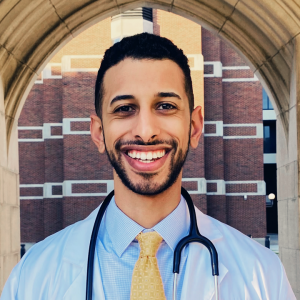
Abraham Almatari always knew he wanted to be a doctor. But he had no idea going to medical school would save his life.
As a college athlete and rock climber, he wanted to go into orthopedics. But things quickly changed thanks to an ultrasound lab during his first year at UTHSC.
“We didn’t have standardized patients because of COVID, so the next best thing was for my classmates and I to act as each other’s patients. One day, we were learning how to do abdominal ultrasounds. I volunteered to be scanned first. We were supposed to find our liver, gallbladder, spleen and both kidneys. We were having trouble finding my left kidney and identifying the spleen,” Almatari said. They called over their professor to help.
With just five minutes left in the lab, three other groups were also eager to ask their professor questions. Almatari’s group happened to be the first one he visited.
“He looked at my left kidney, at my right kidney, and repeated that a couple of times. After going back and forth, I could see the serious look on his face, and at one point it just clicked. I said, ‘my left kidney isn’t supposed to look that is it?’ and he said no.”
Almatari’s professor encouraged him to quickly schedule a doctor’s appointment. But because Almatari had recently moved to Memphis from Knoxville, he didn’t have a local provider. The College of Medicine was quick to help. “My professor notified Dean Womack, who was very helpful in getting me set up with a primary care provider,” Almatari said.
From there, he had scans done and saw a urologist. “When we first discovered how my kidney looked in lab, I really didn’t know what to make of it and was pretty scared. I didn’t know what was going to happen,” Almatari said.
The scans confirmed his worst suspicion: he had cancer. Almatari was faced with the decision to stay in medical school or take time off. Instead of taking a break, he chose to continue his courses. “I went back and forth about it. I would sit at my desk and panic, my thoughts running wild. I would wonder if it had metastasized. I had to focus on reeling in my thoughts and refocusing. School helped me keep my mind off things. I didn’t want to give up if I was going to be fine.”
Over Thanksgiving break during his first semester of medical school, Almatari had his kidney removed. Because it happened in the first months of the pandemic, he was unable to have his family in town. He credits his girlfriend, Lauren Wideman, also a medical student at UTHSC, and the College of Medicine for helping him through one of the most challenging times of his life.
“I had the support I needed. The college helped guide me in what the next steps were and helped communicate what was going on to the professors, who were extremely understanding and made sure I knew they were there to help with whatever I needed.” He ended up only missing one lab throughout his recovery.
Looking back, Almatari isn’t sure what would have happened if he didn’t volunteer to be scanned in his ultrasound lab that day, or if his professor hadn’t visited his group before class ended. He had no indicators that something was wrong and no family history of cancer.
“The variant of cancer I had is very slow growing. There haven’t been any reported cases of it metastasizing, but it was only reported as its own variant in 2016. There isn’t extensive research on it yet. Maybe 20 or 30 years down the road it would have spread. I don’t know, but I’m thankful I don’t have to find out.”
Now, Almatari is a healthy second-year medical student. The only thing that’s changed is he no longer wants to pursue a career in orthopedics. He wants to be a urologist. “I don’t think I would have gone into urology and learned about the field if this hadn’t happened,” Almatari said.
Almatari’s experience has also given him a unique perspective on being a physician. “Leading up to my surgery I was losing my mind, so I truly understand the fear associated with masses and cancers now. I’ll always empathize with what my patients are going through. I’ve experienced it firsthand.”
